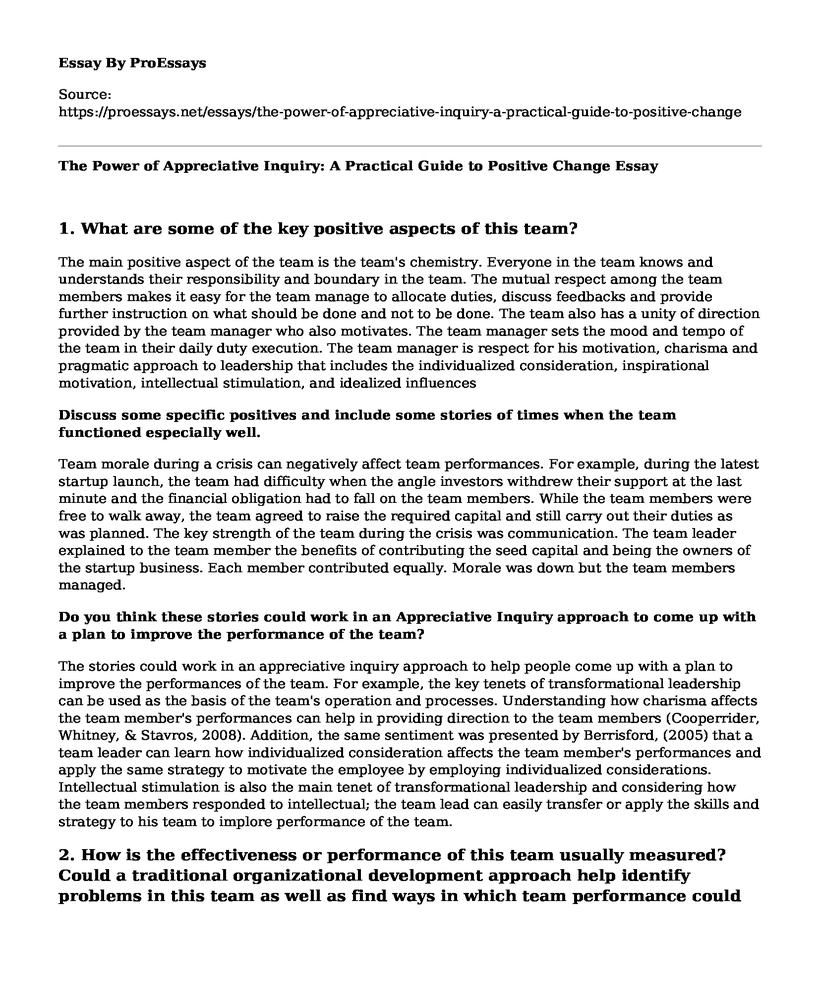1. What are some of the key positive aspects of this team?
The main positive aspect of the team is the team's chemistry. Everyone in the team knows and understands their responsibility and boundary in the team. The mutual respect among the team members makes it easy for the team manage to allocate duties, discuss feedbacks and provide further instruction on what should be done and not to be done. The team also has a unity of direction provided by the team manager who also motivates. The team manager sets the mood and tempo of the team in their daily duty execution. The team manager is respect for his motivation, charisma and pragmatic approach to leadership that includes the individualized consideration, inspirational motivation, intellectual stimulation, and idealized influences
Discuss some specific positives and include some stories of times when the team functioned especially well.
Team morale during a crisis can negatively affect team performances. For example, during the latest startup launch, the team had difficulty when the angle investors withdrew their support at the last minute and the financial obligation had to fall on the team members. While the team members were free to walk away, the team agreed to raise the required capital and still carry out their duties as was planned. The key strength of the team during the crisis was communication. The team leader explained to the team member the benefits of contributing the seed capital and being the owners of the startup business. Each member contributed equally. Morale was down but the team members managed.
Do you think these stories could work in an Appreciative Inquiry approach to come up with a plan to improve the performance of the team?
The stories could work in an appreciative inquiry approach to help people come up with a plan to improve the performances of the team. For example, the key tenets of transformational leadership can be used as the basis of the team's operation and processes. Understanding how charisma affects the team member's performances can help in providing direction to the team members (Cooperrider, Whitney, & Stavros, 2008). Addition, the same sentiment was presented by Berrisford, (2005) that a team leader can learn how individualized consideration affects the team member's performances and apply the same strategy to motivate the employee by employing individualized considerations. Intellectual stimulation is also the main tenet of transformational leadership and considering how the team members responded to intellectual; the team lead can easily transfer or apply the skills and strategy to his team to implore performance of the team.
2. How is the effectiveness or performance of this team usually measured? Could a traditional organizational development approach help identify problems in this team as well as find ways in which team performance could be improved?
Currently, the company has no clear metrics of measuring team effectiveness. However, the company usually rely on metrics such as teamwork, task achievement, improvement in decision making and improved learning in as the key measurement of team effectiveness and performances. The traditional organizational development approach can help in identifying problems within the team. For example, the organizations usually rely on diagnostic measures and benchmarks measurements as the key diagnostics measures. Additionally, the traditional organizational development approach can also help in improving team performance (Lewis, Passmore, & Cantore, 2016). The use of problems solving approach has been common but currently, the company is focusing more on appreciative inquiry to improve team performances. For example, the management has increasingly focused on improving the positive cores such as strengths, best practices and key learnings to improve team performances
3. Overall, do you think an Appreciative Inquiry or a traditional organizational development would be better for this team? If your team were to hire a consultant, what type of approach would you want the consultant to take?
Overall, I think appreciative inquiry would do better for this team. The appreciative inquiry approach would be more advisable because traditional organizational development approach is too general while appreciative inquiry can provide a realistic more specific solution to the problems (Whitney, & Trosten-Bloom, 2010). For example, taking the team to boot camps and conferences with another effective team would help the team members learn about the best practices that worked for other teams in the same sector/ industry.
References
Cooperrider, L., Whitney, K., & Stavros, M. (2008). Appreciative Inquiry Handbook: For Leaders of Change. Brunswick, OH: Berrett-Koehler Publishers.
Berrisford, S. (2005). Using Appreciative Inquiry to drive change at the BBC. Strategic Communication Management, 9(3), 22-25.
Whitney, K., & Trosten-Bloom, A. (2010). Chapter 1: What is Appreciative Inquiry? The Power of Appreciative Inquiry: A Practical Guide to Positive Change. San Francisco: Berrett-Koehler Publishers.
Lewis, S., Passmore, J., & Cantore, S. (2016). Chapter 4: Appreciative inquiry: How do you do it? In Appreciative inquiry for change management: Using AI to facilitate organizationaldevelopment. London: Kogan Page
Cite this page
The Power of Appreciative Inquiry: A Practical Guide to Positive Change. (2022, May 26). Retrieved from https://proessays.net/essays/the-power-of-appreciative-inquiry-a-practical-guide-to-positive-change
If you are the original author of this essay and no longer wish to have it published on the ProEssays website, please click below to request its removal:
- Microsoft Corporation: Field Force Analysis Paper Example
- Competitive and Economic Sustainability of Beautonomy Paper Example
- Strategic Analysis and Internationalization of McDonalds Paper Example
- Essay Example on American Business Culture: An Inclusive Land of Opportunity
- McDonald's: Healthy Options for Your Unique Needs - Essay Sample
- Paper Example on Leadership Through Tribal Understanding: A TED Talk by David Logan
- Generic and Corporate Strategies of the Bank of America







